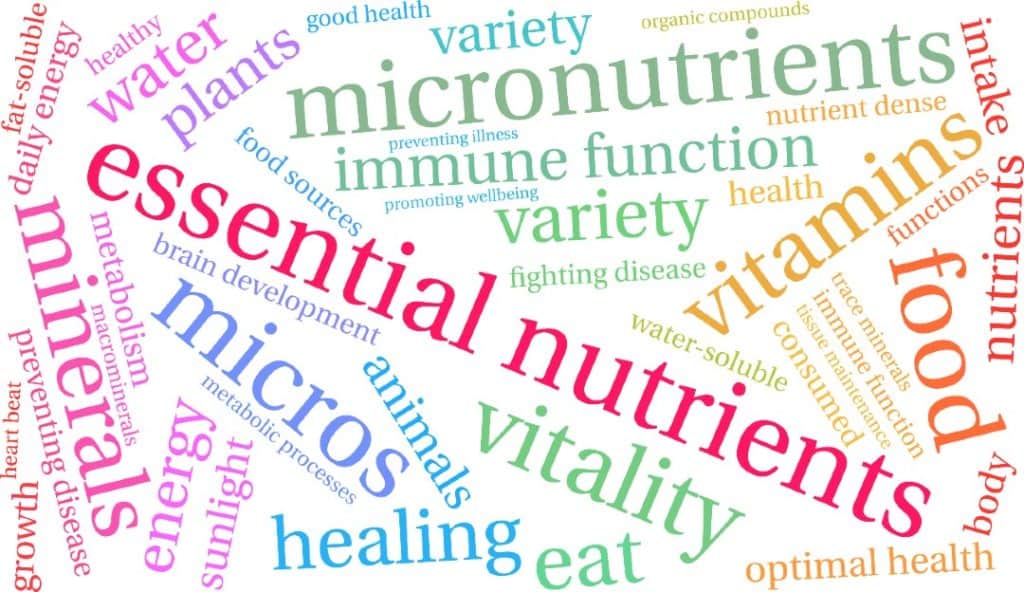Intro to Micronutrients: 101
Suppose you were a senior in high school and had a pop quiz on micro and macronutrients. How well do you think you would do? How would you do today, without taking a class on nutrition?
Today you can test your knowledge about micronutrients, as well as learn a bit more about these critical components of health.
Defining Micro and Macronutrients
To understand why nutritional elements are described as either macro or micronutrients, it’s helpful to know that the prefix macro comes from the Greek word for large, while micro comes from the Greek for small.
So, let’s start with micronutrients. The word micronutrients generally describe vitamins and minerals available from our food. This contrasts with macronutrients, which include the nutritional elements such as proteins, fats, and carbohydrates, which are needed by the body in much larger volumes. Bodybuilders are known to throw around the term “macro” as a short-hand for these energy power sources.
Learn about Deficiencies and Essential Nutrients

Next up on our nutritional mini-lesson are a few more definitions–like deficiency.
A nutritional deficiency definition may be handed down by a health professional when a person isn’t getting enough of an essential nutrient, or that their body isn’t able to absorb the nutrient for some reason. Depending on the nutrient, a deficiency may be reflected in a number of health problems such as skin, nail, or bone growth issues, developmental issues, and digestive or cognitive disorders.
In the micronutrient category, there are many reasons a mineral deficiency may occur. Shortages of calcium, iron, magnesium, potassium, and zinc are just a few that are common. Depending on the particular mineral in short supply, there may be different symptoms and results. For example, a deficiency in zinc might result in stunted growth.
Now let’s define essential nutrients. Essential nutrients are best described as nutrients that must be obtained either from the diet or as a supplement because the body cannot make them in the quantities it needs. Many vitamins, like vitamin C, are essential nutrients. It’s important to know that while they are vital for life, some essential nutrients may be toxic in too large amounts, so it’s important not to take too much of them.
Daily Greens: An Easy Way to Get What Your Diet Is Lacking
Daily plant-based formulas are an excellent way to get essential nutrients from antioxidant-packed berries, fruits, and vegetables to ensure a fully balanced diet. Look for formulas designed to increase energy levels and help the body detoxify. These are ideal for people who consume less than the optimal amount of fruits and vegetables each day. A good option is Revive’s Daily Greens capsules which are gluten-free and dairy-free. The use of this nutrition-rich formula daily also helps improve pH and fiber value.
More on Micronutrient Deficiencies
As you are probably starting to be aware, a micronutrient deficiency can happen when we miss any essential element in our diet. Below are a few common ones to avoid.
According to Healthline, you may be interested to know that the most common mineral deficiency worldwide is iron. Fortunately, Daily Greens is replete with dark green leafy vegetables that are high in iron. It contains broccoli, kale, and spinach extracts–all rich in iron–along with wheatgrass and spirulina.
Getting too little calcium in our diets is quite common. In particular, women should be careful to get enough calcium, as should older adults, because both segments of the population are at risk for osteoporosis. Again, dark green vegetables like those used in Daily Greens are high in calcium.
Time for a pop quiz question: “Which mineral is necessary for the regulation of blood pressure and fluid balance in the body?”
The answer: Potassium
Your body needs potassium to regulate its blood pressure and heart rhythm. Potassium helps maintain the required water content in cells. And the mineral is essential for the proper functioning of nerves, muscles, and digestion.
A Summary of Macronutrients and Micronutrients
Here are some additional examples of micronutrients.
Vitamins are either water-soluble or fat-soluble. Water-soluble vitamins include the B-vitamins, often called the multi-Bs (which include riboflavin, niacin, and folate) and vitamin C. If you take individual supplements of these, make sure to take them with water. The fat-soluble vitamins are vitamins A, D, E, and K, and they should be taken with food.
You’ll remember from earlier that there are three types of macronutrients: carbohydrates, proteins, and fats. Micronutrients and macronutrients are both essential for our health.
Okay, ready for your last quiz question?
Alcohol is considered an essential nutrient.
True or False?
Sorry, but if you were hoping alcohol is considered an essential nutrient, you are going to be disappointed. According to MedicineNet, essential nutrients that your body needs include carbohydrates and fat. Still, while many people crave alcohol, alcohol does not make it an essential nutrient because not having it in your diet doesn’t lead to any kind of deficiency.
The Last Word on Nutrition
Learning about nutrition can be both fun and help you achieve ideal health. For example, while minerals are found in both rocks and everyday dirt, there are no fewer than 16 different minerals that humans need to get in their diet.
To read more about macro and micronutrients in particular and understand what other supplements can help in your absorption of them, check out this article on Understanding Micronutrients: Benefits and Types.
The more you know about your body and what it needs, the better you can take care of it.







